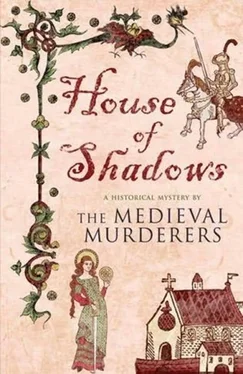He felt himself in a quandary. If he held his tongue, the fool of a coroner might well decide to take the easiest suspect and accuse him. There were so many down this way who would have no opportunity to defend themselves if he set his face against them. There was no justice for the poor.
‘Brother Lawrence,’ Baldwin said, ‘tell me: you appeared to be about to speak more when that fool arrived. This Pilgrim – did he have many enemies apart from this woman’s family?’
‘Well, Pilgrim was a young man, and who can tell what mischief he may have attempted? There could be someone somewhere who had cause to nurse a grievance against him. Juliet surely would not. She was an amiable, kindly soul. I always thought that she would make a good mother, although not with-’
‘Not with whom?’ Baldwin demanded.
‘I was forced to swear an oath of silence before I could do this thing,’ Lawrence said unhappily.
‘What “thing”? Marry her?’ Baldwin asked keenly, and Lawrence could do nothing but look away.
But he was relieved. The secret was out.
Timothy Capun had never been tall. He possessed the frame of a man who had suffered from malnutrition as a child, a permanent reminder of the famine eight years before. His face held evidence of the virulent malady that had caused his face to be pocked and marked with scars, so his appearance was not the most prepossessing.
Entering the great hall and seeing his father seated on one of the benches near the middle of the room, close by the great fire that had been relighted against the damp cool of this unseasonal summer, his face grew morose, and he crossed the hall’s tiled floor to stand by Henry Capun’s side.
‘What do you want?’
‘Father, I wanted to offer you my sympathy. We both loved her.’
Henry looked up at his son. His face was twisted, but then his pain left his features and he could stare at his son with entirely blank eyes. ‘Did you do it?’
‘What, father?’
‘You know what. Did you kill your sister? Because even if it means I live the rest of my days in a gaol and depart this earth straight to hell, I swear if I learn you killed my little Juliet I’ll see your body swinging.’
‘Father, you don’t think I could hurt my sister? I loved her too.’
Henry spat, ‘You have no understanding of the word “love”!’
It was some little while later that Baldwin and Simon reviewed the monk’s words while sitting in a dingy, noisome tavern near the south side of the bridge.
‘I did not like that coroner,’ Baldwin admitted. ‘He struck me as too confident. A man who is that confident is a danger to justice. He ought to listen and gauge the evidence, not go rushing to assume only one solution to a problem.’
‘You were not keen on the monk, either.’
‘True,’ Baldwin admitted. He considered, at last grunting: ‘Ach – he is a monk from an order that holds to certainties in the same way as that coroner does. Cluniacs are so convinced of their place in the world and the security of their posts in heaven that there are rarely any chinks in their armour to allow even a small iota of doubt to enter. I do not trust men who never doubt themselves. Doubt seems to me to be an essential ingredient in an investigation. You doubt what each witness says; you question them because you doubt your own understanding; you have to doubt everything if you are to get to the truth.’
‘You mistrust him simply because he is a monk?’
Baldwin nodded. ‘Aye. I fear so. Still, he was useful, was he not?’
‘We know that she was married, yes. Although to whom…to the dead lad?’
Baldwin grunted. After letting slip that tantalizing detail, the monk had clammed up, claiming that the whole affair was secret and he had sworn to hold his tongue. He would not answer any more questions.
‘We must wait until tomorrow, anyway, to hear what is said at the inquest.’
‘I look forward to seeing the First Finder describe what she found,’ Baldwin said. ‘Those two bodies…they were strangely set out. The man, Pilgrim, had been dragged down to be concealed, and then laid out neatly.’
‘As though a monk had killed him and tidied him up?’ Simon said.
‘Possibly. But what reason could the monk have had for killing him?’
‘The girl was attractive. Could a monk have desired her, killed the boy from jealousy and then killed her?’
‘Possibly. And yet Brother Lawrence was convinced that the girl’s family had a hatred for Pilgrim. They would think that their little girl had married beneath herself. Perhaps they sought to punish both?’
‘I would like to speak to them.’
Baldwin eyed him. ‘These are the very ones who have asked for Bishop Walter to enquire into the death.’
‘It would hardly be the first time that the guilty were those who demanded the greatest efforts. And in any case, if they are innocent they may still be able to help us with some aspects of the girl’s life. Any information can be useful.’
‘True!’ Baldwin said. He finished his drink. ‘And yet I dare say that of all possible suspects this family is the one that is least likely.’
‘Why?’
‘Because if one of the corpses was to be set out neatly, surely any father would lay out his own daughter, rather than the bastard who’d ravished her – married or not?’
They found the Capun house with ease. London was a huge city, but men as wealthy and powerful as Henry Capun were not common.
Simon had never heard of the man, and he was comfortably certain that neither had Baldwin, but it soon became obvious that Henry Capun was a renowned man in London, and when they caught sight of his house Simon for one was daunted by the size of the place. He was perfectly used to seeing large houses, and he had himself participated in the questioning of noblemen and others – but that had been different. It had been in his own county of Devon. Standing here in the street they called the Strand, just outside the city’s walls, not too far from the bishop’s own hall, Simon was overwhelmed by a sense of his own insignificance.
If he had been alone, he would have left there and then, but fortunately it appeared that Baldwin suffered fewer qualms about questioning the man. The knight rapped sharply on the timbers of the porter’s door and curtly demanded to be shown to the banneret.
Henry Capun looked as though he had been drinking too much for too long. His features were flabby and choleric. He had a circular face, with a neck that was thick from excess, and his paunch was like a barrel slung low over his belt. Simon privately thought that this was one of those men who wore his soul on his sleeve for all to see. He was an insipid fellow, weak and ravaged by the least setback.
His initial impression was to be quickly destroyed.
‘Who are you?’
While Baldwin introduced them, Henry studied them minutely, Simon saw. Then he jerked his chin at Simon. ‘You’re a bailiff from Dartmoor? You knew Abbot Champeaux?’
Simon nodded. ‘I worked for him these last eight years or so.’
‘I knew him. A good man, and a damned hard one to win a bargain from. Aye, I knew him. He’ll be missed.’ He turned back to Baldwin. ‘Not as much as my daughter will in this house, though. Bishop Stapledon told you to find her murderer, I hope?’
‘He did.’
‘And?’
‘We have just come here from the place where she died. The inquest will be tomorrow – someone has told you of this?’
‘Yes. The coroner was good enough to send a man to tell me when I may go to hear about her…her death.’
His voice dropped for those last two words, and his head sank on his shoulders as though its weight was insupportable. But then he rallied and fixed Baldwin with a stern gaze. ‘I want the murderer found. I don’t care who it is, how rich he is – I want him found and hanged.’
Читать дальше












